Research Proposal: Examining Mandatory CSR/ESG in Corporate Law
VerifiedAdded on 2023/03/23
|15
|3745
|87
Report
AI Summary
This research proposal examines the question of whether Corporate Social Responsibility (CSR) and Environmental Social Governance (ESG) should be mandatory. It begins by defining CSR and ESG, highlighting their importance in modern corporate governance, and noting the shift from profit-maximization to considering social and environmental impacts. The proposal outlines the research question, which focuses on the positive and negative impacts of mandatory versus voluntary CSR/ESG. The aims and objectives include analyzing the key concepts of CSR/ESG, exploring their relationship with financial performance, comparing the benefits and challenges of both voluntary and mandatory approaches, and proposing an appropriate approach for CSR/ESG in social and legal aspects. The literature review covers the meaning and background of CSR/ESG, advantages and disadvantages, and their impact on corporate governance, particularly within the Australian context. The proposal also mentions the research methodology, structure, and expected outcomes, including a potential framework for future research.
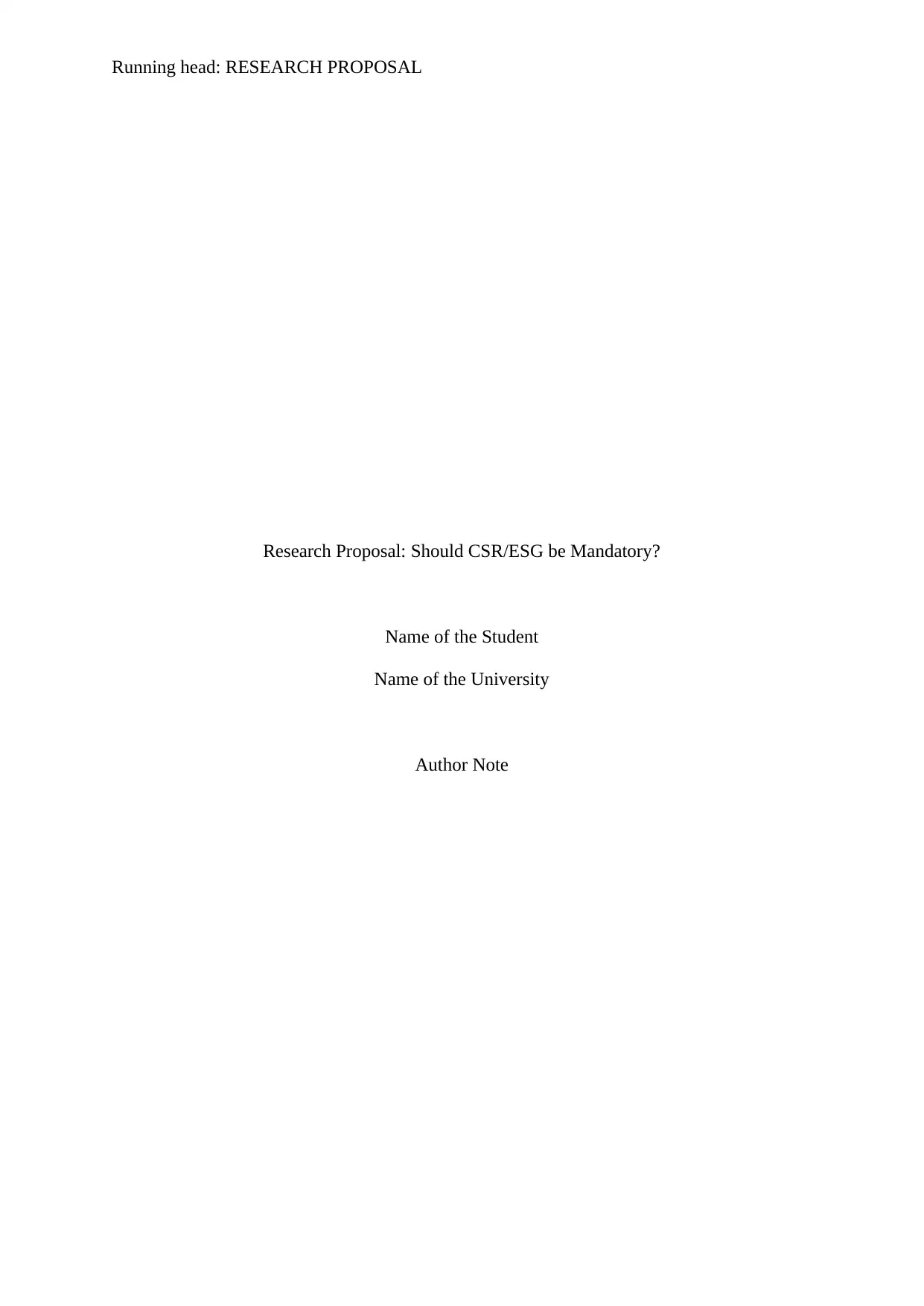
Running head: RESEARCH PROPOSAL
Research Proposal: Should CSR/ESG be Mandatory?
Name of the Student
Name of the University
Author Note
Research Proposal: Should CSR/ESG be Mandatory?
Name of the Student
Name of the University
Author Note
Paraphrase This Document
Need a fresh take? Get an instant paraphrase of this document with our AI Paraphraser
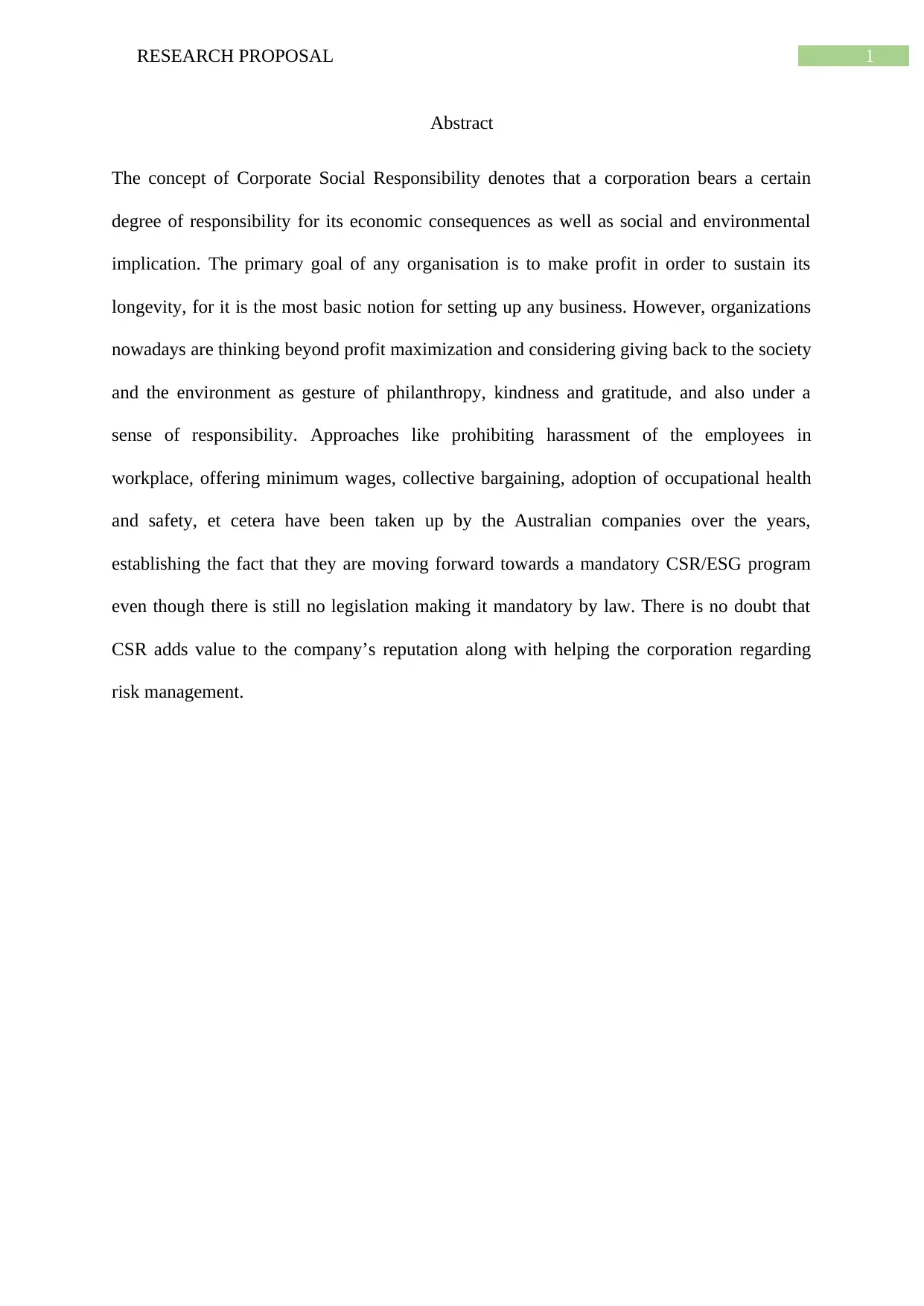
1RESEARCH PROPOSAL
Abstract
The concept of Corporate Social Responsibility denotes that a corporation bears a certain
degree of responsibility for its economic consequences as well as social and environmental
implication. The primary goal of any organisation is to make profit in order to sustain its
longevity, for it is the most basic notion for setting up any business. However, organizations
nowadays are thinking beyond profit maximization and considering giving back to the society
and the environment as gesture of philanthropy, kindness and gratitude, and also under a
sense of responsibility. Approaches like prohibiting harassment of the employees in
workplace, offering minimum wages, collective bargaining, adoption of occupational health
and safety, et cetera have been taken up by the Australian companies over the years,
establishing the fact that they are moving forward towards a mandatory CSR/ESG program
even though there is still no legislation making it mandatory by law. There is no doubt that
CSR adds value to the company’s reputation along with helping the corporation regarding
risk management.
Abstract
The concept of Corporate Social Responsibility denotes that a corporation bears a certain
degree of responsibility for its economic consequences as well as social and environmental
implication. The primary goal of any organisation is to make profit in order to sustain its
longevity, for it is the most basic notion for setting up any business. However, organizations
nowadays are thinking beyond profit maximization and considering giving back to the society
and the environment as gesture of philanthropy, kindness and gratitude, and also under a
sense of responsibility. Approaches like prohibiting harassment of the employees in
workplace, offering minimum wages, collective bargaining, adoption of occupational health
and safety, et cetera have been taken up by the Australian companies over the years,
establishing the fact that they are moving forward towards a mandatory CSR/ESG program
even though there is still no legislation making it mandatory by law. There is no doubt that
CSR adds value to the company’s reputation along with helping the corporation regarding
risk management.
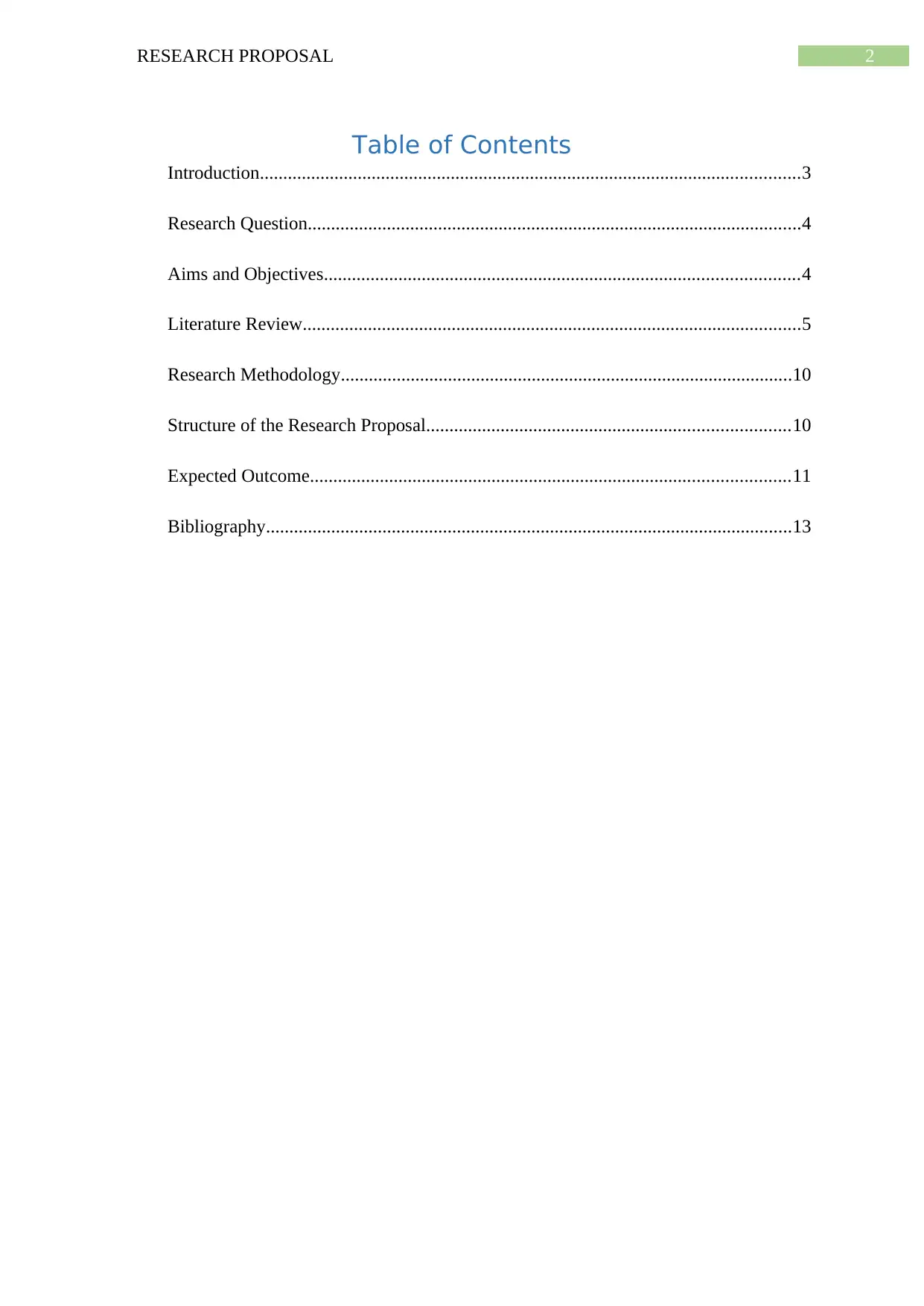
2RESEARCH PROPOSAL
Table of Contents
Introduction....................................................................................................................3
Research Question..........................................................................................................4
Aims and Objectives......................................................................................................4
Literature Review...........................................................................................................5
Research Methodology.................................................................................................10
Structure of the Research Proposal..............................................................................10
Expected Outcome.......................................................................................................11
Bibliography.................................................................................................................13
Table of Contents
Introduction....................................................................................................................3
Research Question..........................................................................................................4
Aims and Objectives......................................................................................................4
Literature Review...........................................................................................................5
Research Methodology.................................................................................................10
Structure of the Research Proposal..............................................................................10
Expected Outcome.......................................................................................................11
Bibliography.................................................................................................................13
⊘ This is a preview!⊘
Do you want full access?
Subscribe today to unlock all pages.

Trusted by 1+ million students worldwide
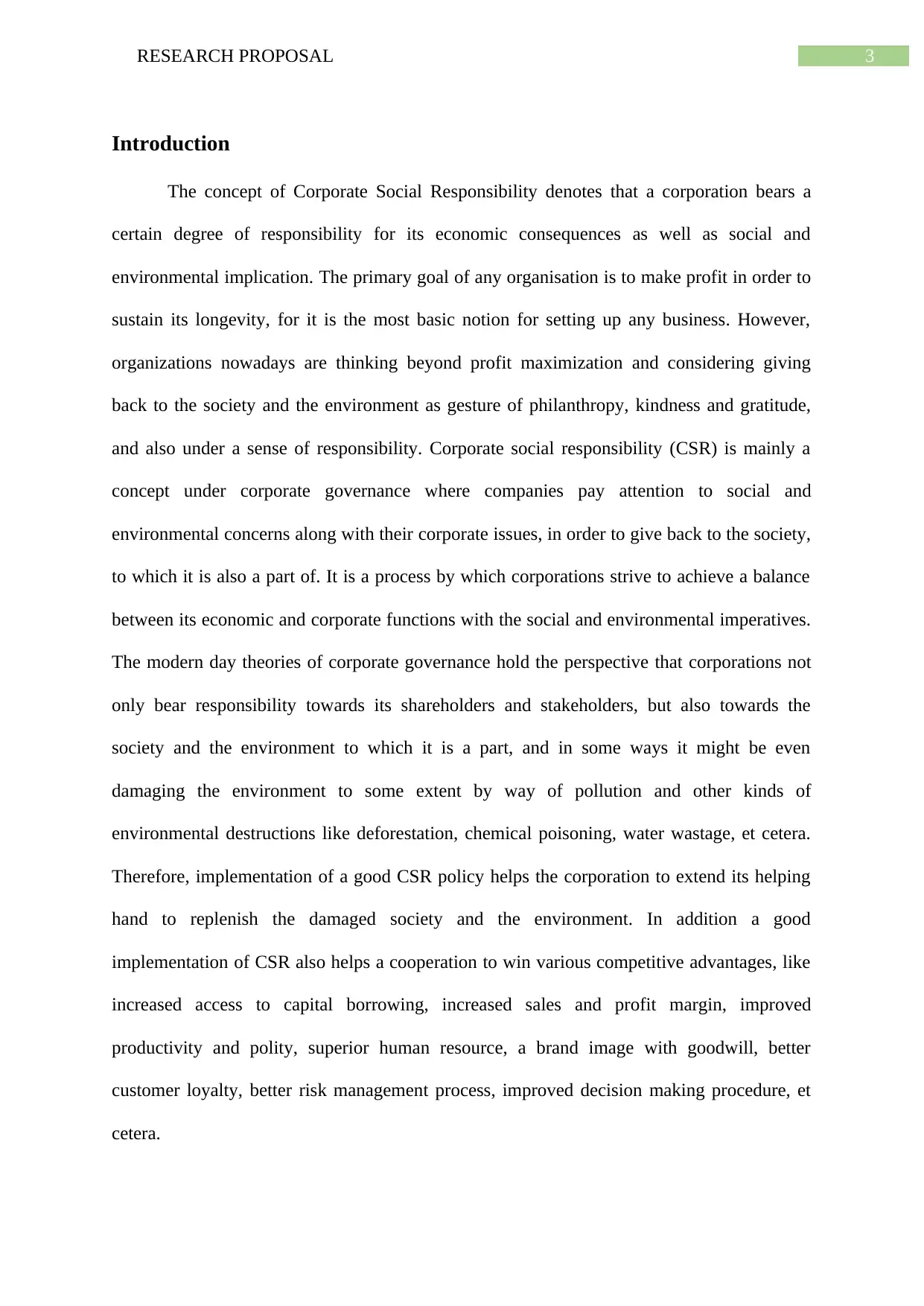
3RESEARCH PROPOSAL
Introduction
The concept of Corporate Social Responsibility denotes that a corporation bears a
certain degree of responsibility for its economic consequences as well as social and
environmental implication. The primary goal of any organisation is to make profit in order to
sustain its longevity, for it is the most basic notion for setting up any business. However,
organizations nowadays are thinking beyond profit maximization and considering giving
back to the society and the environment as gesture of philanthropy, kindness and gratitude,
and also under a sense of responsibility. Corporate social responsibility (CSR) is mainly a
concept under corporate governance where companies pay attention to social and
environmental concerns along with their corporate issues, in order to give back to the society,
to which it is also a part of. It is a process by which corporations strive to achieve a balance
between its economic and corporate functions with the social and environmental imperatives.
The modern day theories of corporate governance hold the perspective that corporations not
only bear responsibility towards its shareholders and stakeholders, but also towards the
society and the environment to which it is a part, and in some ways it might be even
damaging the environment to some extent by way of pollution and other kinds of
environmental destructions like deforestation, chemical poisoning, water wastage, et cetera.
Therefore, implementation of a good CSR policy helps the corporation to extend its helping
hand to replenish the damaged society and the environment. In addition a good
implementation of CSR also helps a cooperation to win various competitive advantages, like
increased access to capital borrowing, increased sales and profit margin, improved
productivity and polity, superior human resource, a brand image with goodwill, better
customer loyalty, better risk management process, improved decision making procedure, et
cetera.
Introduction
The concept of Corporate Social Responsibility denotes that a corporation bears a
certain degree of responsibility for its economic consequences as well as social and
environmental implication. The primary goal of any organisation is to make profit in order to
sustain its longevity, for it is the most basic notion for setting up any business. However,
organizations nowadays are thinking beyond profit maximization and considering giving
back to the society and the environment as gesture of philanthropy, kindness and gratitude,
and also under a sense of responsibility. Corporate social responsibility (CSR) is mainly a
concept under corporate governance where companies pay attention to social and
environmental concerns along with their corporate issues, in order to give back to the society,
to which it is also a part of. It is a process by which corporations strive to achieve a balance
between its economic and corporate functions with the social and environmental imperatives.
The modern day theories of corporate governance hold the perspective that corporations not
only bear responsibility towards its shareholders and stakeholders, but also towards the
society and the environment to which it is a part, and in some ways it might be even
damaging the environment to some extent by way of pollution and other kinds of
environmental destructions like deforestation, chemical poisoning, water wastage, et cetera.
Therefore, implementation of a good CSR policy helps the corporation to extend its helping
hand to replenish the damaged society and the environment. In addition a good
implementation of CSR also helps a cooperation to win various competitive advantages, like
increased access to capital borrowing, increased sales and profit margin, improved
productivity and polity, superior human resource, a brand image with goodwill, better
customer loyalty, better risk management process, improved decision making procedure, et
cetera.
Paraphrase This Document
Need a fresh take? Get an instant paraphrase of this document with our AI Paraphraser
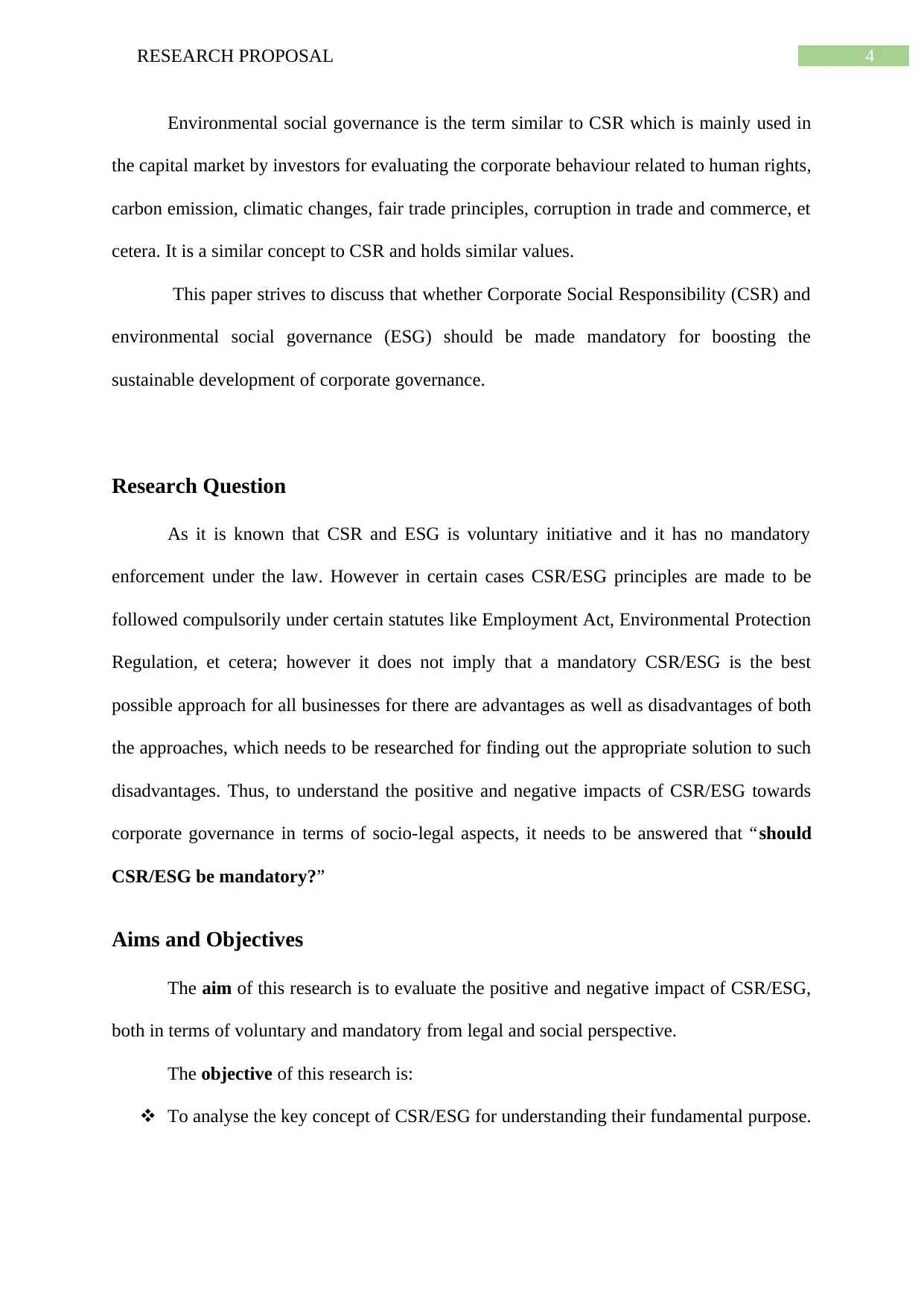
4RESEARCH PROPOSAL
Environmental social governance is the term similar to CSR which is mainly used in
the capital market by investors for evaluating the corporate behaviour related to human rights,
carbon emission, climatic changes, fair trade principles, corruption in trade and commerce, et
cetera. It is a similar concept to CSR and holds similar values.
This paper strives to discuss that whether Corporate Social Responsibility (CSR) and
environmental social governance (ESG) should be made mandatory for boosting the
sustainable development of corporate governance.
Research Question
As it is known that CSR and ESG is voluntary initiative and it has no mandatory
enforcement under the law. However in certain cases CSR/ESG principles are made to be
followed compulsorily under certain statutes like Employment Act, Environmental Protection
Regulation, et cetera; however it does not imply that a mandatory CSR/ESG is the best
possible approach for all businesses for there are advantages as well as disadvantages of both
the approaches, which needs to be researched for finding out the appropriate solution to such
disadvantages. Thus, to understand the positive and negative impacts of CSR/ESG towards
corporate governance in terms of socio-legal aspects, it needs to be answered that “should
CSR/ESG be mandatory?”
Aims and Objectives
The aim of this research is to evaluate the positive and negative impact of CSR/ESG,
both in terms of voluntary and mandatory from legal and social perspective.
The objective of this research is:
To analyse the key concept of CSR/ESG for understanding their fundamental purpose.
Environmental social governance is the term similar to CSR which is mainly used in
the capital market by investors for evaluating the corporate behaviour related to human rights,
carbon emission, climatic changes, fair trade principles, corruption in trade and commerce, et
cetera. It is a similar concept to CSR and holds similar values.
This paper strives to discuss that whether Corporate Social Responsibility (CSR) and
environmental social governance (ESG) should be made mandatory for boosting the
sustainable development of corporate governance.
Research Question
As it is known that CSR and ESG is voluntary initiative and it has no mandatory
enforcement under the law. However in certain cases CSR/ESG principles are made to be
followed compulsorily under certain statutes like Employment Act, Environmental Protection
Regulation, et cetera; however it does not imply that a mandatory CSR/ESG is the best
possible approach for all businesses for there are advantages as well as disadvantages of both
the approaches, which needs to be researched for finding out the appropriate solution to such
disadvantages. Thus, to understand the positive and negative impacts of CSR/ESG towards
corporate governance in terms of socio-legal aspects, it needs to be answered that “should
CSR/ESG be mandatory?”
Aims and Objectives
The aim of this research is to evaluate the positive and negative impact of CSR/ESG,
both in terms of voluntary and mandatory from legal and social perspective.
The objective of this research is:
To analyse the key concept of CSR/ESG for understanding their fundamental purpose.
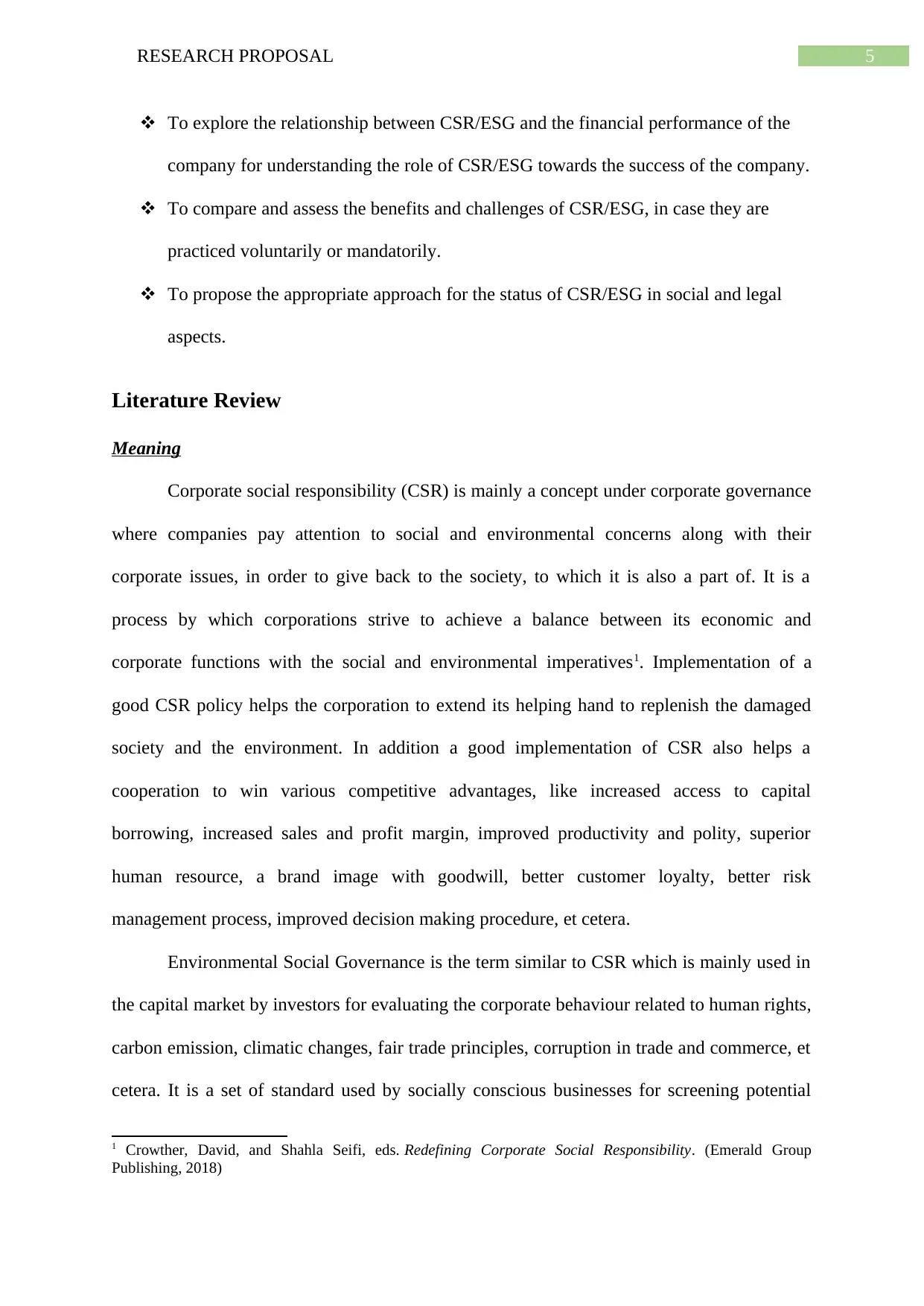
5RESEARCH PROPOSAL
To explore the relationship between CSR/ESG and the financial performance of the
company for understanding the role of CSR/ESG towards the success of the company.
To compare and assess the benefits and challenges of CSR/ESG, in case they are
practiced voluntarily or mandatorily.
To propose the appropriate approach for the status of CSR/ESG in social and legal
aspects.
Literature Review
Meaning
Corporate social responsibility (CSR) is mainly a concept under corporate governance
where companies pay attention to social and environmental concerns along with their
corporate issues, in order to give back to the society, to which it is also a part of. It is a
process by which corporations strive to achieve a balance between its economic and
corporate functions with the social and environmental imperatives1. Implementation of a
good CSR policy helps the corporation to extend its helping hand to replenish the damaged
society and the environment. In addition a good implementation of CSR also helps a
cooperation to win various competitive advantages, like increased access to capital
borrowing, increased sales and profit margin, improved productivity and polity, superior
human resource, a brand image with goodwill, better customer loyalty, better risk
management process, improved decision making procedure, et cetera.
Environmental Social Governance is the term similar to CSR which is mainly used in
the capital market by investors for evaluating the corporate behaviour related to human rights,
carbon emission, climatic changes, fair trade principles, corruption in trade and commerce, et
cetera. It is a set of standard used by socially conscious businesses for screening potential
1 Crowther, David, and Shahla Seifi, eds. Redefining Corporate Social Responsibility. (Emerald Group
Publishing, 2018)
To explore the relationship between CSR/ESG and the financial performance of the
company for understanding the role of CSR/ESG towards the success of the company.
To compare and assess the benefits and challenges of CSR/ESG, in case they are
practiced voluntarily or mandatorily.
To propose the appropriate approach for the status of CSR/ESG in social and legal
aspects.
Literature Review
Meaning
Corporate social responsibility (CSR) is mainly a concept under corporate governance
where companies pay attention to social and environmental concerns along with their
corporate issues, in order to give back to the society, to which it is also a part of. It is a
process by which corporations strive to achieve a balance between its economic and
corporate functions with the social and environmental imperatives1. Implementation of a
good CSR policy helps the corporation to extend its helping hand to replenish the damaged
society and the environment. In addition a good implementation of CSR also helps a
cooperation to win various competitive advantages, like increased access to capital
borrowing, increased sales and profit margin, improved productivity and polity, superior
human resource, a brand image with goodwill, better customer loyalty, better risk
management process, improved decision making procedure, et cetera.
Environmental Social Governance is the term similar to CSR which is mainly used in
the capital market by investors for evaluating the corporate behaviour related to human rights,
carbon emission, climatic changes, fair trade principles, corruption in trade and commerce, et
cetera. It is a set of standard used by socially conscious businesses for screening potential
1 Crowther, David, and Shahla Seifi, eds. Redefining Corporate Social Responsibility. (Emerald Group
Publishing, 2018)
⊘ This is a preview!⊘
Do you want full access?
Subscribe today to unlock all pages.

Trusted by 1+ million students worldwide
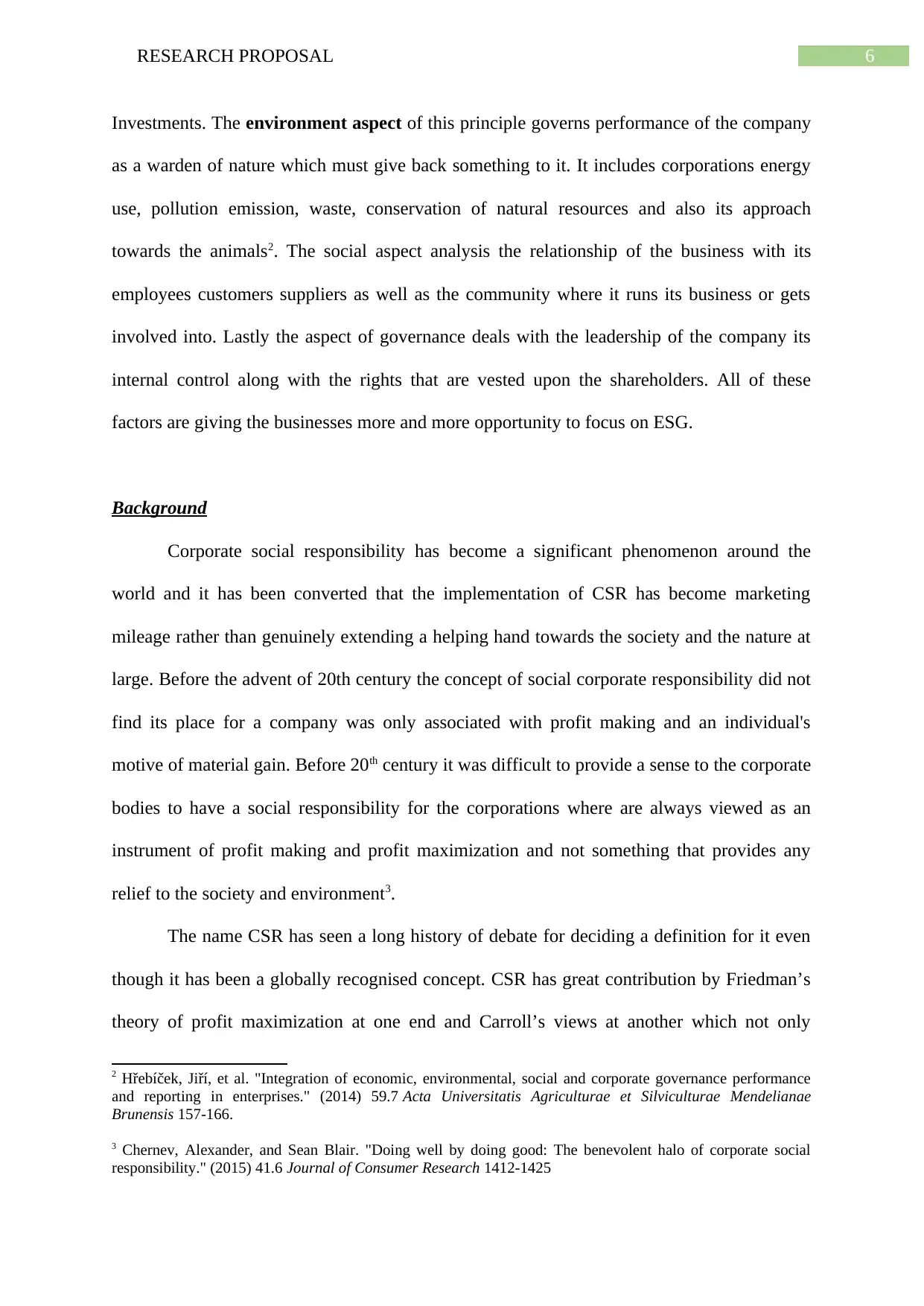
6RESEARCH PROPOSAL
Investments. The environment aspect of this principle governs performance of the company
as a warden of nature which must give back something to it. It includes corporations energy
use, pollution emission, waste, conservation of natural resources and also its approach
towards the animals2. The social aspect analysis the relationship of the business with its
employees customers suppliers as well as the community where it runs its business or gets
involved into. Lastly the aspect of governance deals with the leadership of the company its
internal control along with the rights that are vested upon the shareholders. All of these
factors are giving the businesses more and more opportunity to focus on ESG.
Background
Corporate social responsibility has become a significant phenomenon around the
world and it has been converted that the implementation of CSR has become marketing
mileage rather than genuinely extending a helping hand towards the society and the nature at
large. Before the advent of 20th century the concept of social corporate responsibility did not
find its place for a company was only associated with profit making and an individual's
motive of material gain. Before 20th century it was difficult to provide a sense to the corporate
bodies to have a social responsibility for the corporations where are always viewed as an
instrument of profit making and profit maximization and not something that provides any
relief to the society and environment3.
The name CSR has seen a long history of debate for deciding a definition for it even
though it has been a globally recognised concept. CSR has great contribution by Friedman’s
theory of profit maximization at one end and Carroll’s views at another which not only
2 Hřebíček, Jiří, et al. "Integration of economic, environmental, social and corporate governance performance
and reporting in enterprises." (2014) 59.7 Acta Universitatis Agriculturae et Silviculturae Mendelianae
Brunensis 157-166.
3 Chernev, Alexander, and Sean Blair. "Doing well by doing good: The benevolent halo of corporate social
responsibility." (2015) 41.6 Journal of Consumer Research 1412-1425
Investments. The environment aspect of this principle governs performance of the company
as a warden of nature which must give back something to it. It includes corporations energy
use, pollution emission, waste, conservation of natural resources and also its approach
towards the animals2. The social aspect analysis the relationship of the business with its
employees customers suppliers as well as the community where it runs its business or gets
involved into. Lastly the aspect of governance deals with the leadership of the company its
internal control along with the rights that are vested upon the shareholders. All of these
factors are giving the businesses more and more opportunity to focus on ESG.
Background
Corporate social responsibility has become a significant phenomenon around the
world and it has been converted that the implementation of CSR has become marketing
mileage rather than genuinely extending a helping hand towards the society and the nature at
large. Before the advent of 20th century the concept of social corporate responsibility did not
find its place for a company was only associated with profit making and an individual's
motive of material gain. Before 20th century it was difficult to provide a sense to the corporate
bodies to have a social responsibility for the corporations where are always viewed as an
instrument of profit making and profit maximization and not something that provides any
relief to the society and environment3.
The name CSR has seen a long history of debate for deciding a definition for it even
though it has been a globally recognised concept. CSR has great contribution by Friedman’s
theory of profit maximization at one end and Carroll’s views at another which not only
2 Hřebíček, Jiří, et al. "Integration of economic, environmental, social and corporate governance performance
and reporting in enterprises." (2014) 59.7 Acta Universitatis Agriculturae et Silviculturae Mendelianae
Brunensis 157-166.
3 Chernev, Alexander, and Sean Blair. "Doing well by doing good: The benevolent halo of corporate social
responsibility." (2015) 41.6 Journal of Consumer Research 1412-1425
Paraphrase This Document
Need a fresh take? Get an instant paraphrase of this document with our AI Paraphraser
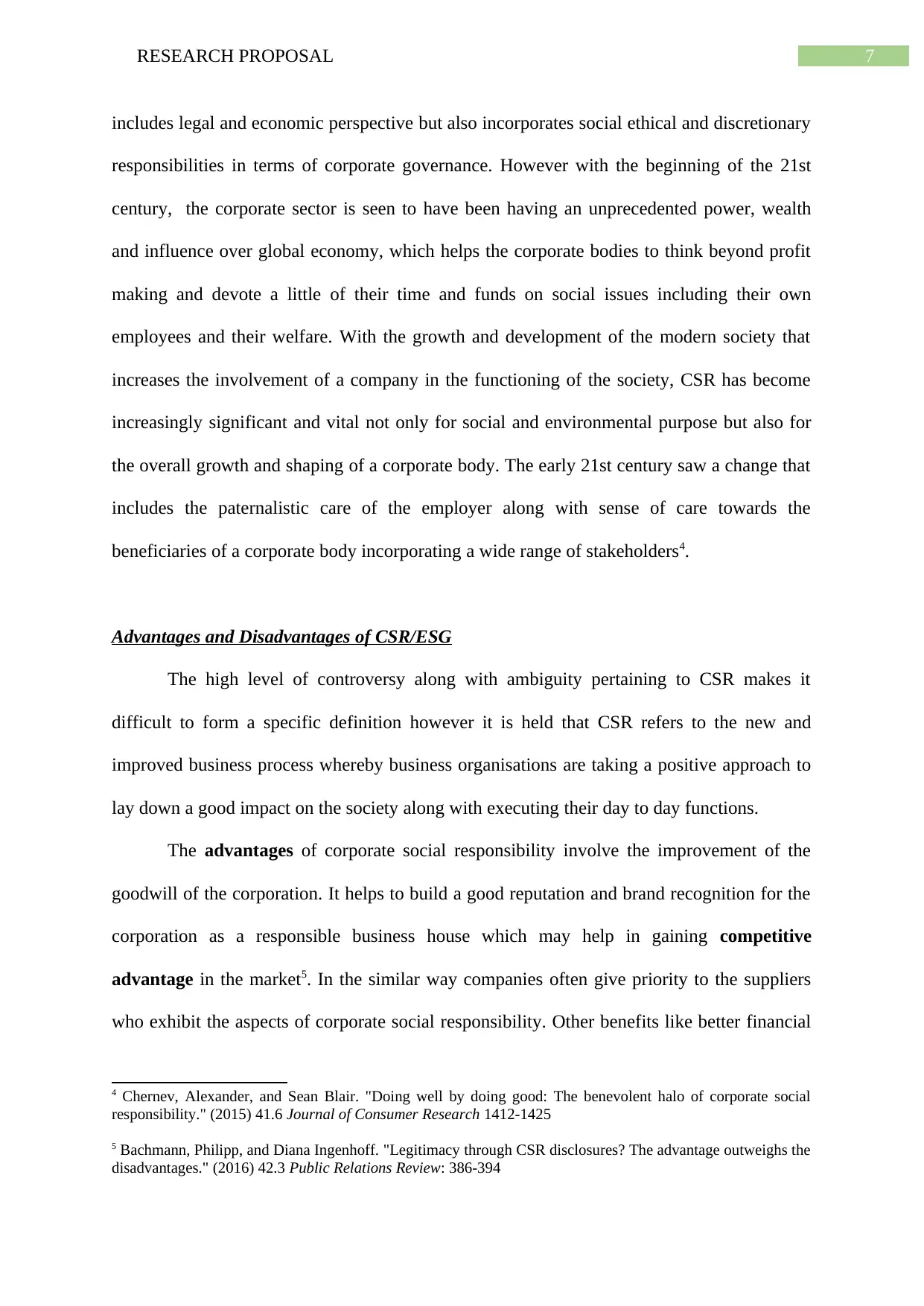
7RESEARCH PROPOSAL
includes legal and economic perspective but also incorporates social ethical and discretionary
responsibilities in terms of corporate governance. However with the beginning of the 21st
century, the corporate sector is seen to have been having an unprecedented power, wealth
and influence over global economy, which helps the corporate bodies to think beyond profit
making and devote a little of their time and funds on social issues including their own
employees and their welfare. With the growth and development of the modern society that
increases the involvement of a company in the functioning of the society, CSR has become
increasingly significant and vital not only for social and environmental purpose but also for
the overall growth and shaping of a corporate body. The early 21st century saw a change that
includes the paternalistic care of the employer along with sense of care towards the
beneficiaries of a corporate body incorporating a wide range of stakeholders4.
Advantages and Disadvantages of CSR/ESG
The high level of controversy along with ambiguity pertaining to CSR makes it
difficult to form a specific definition however it is held that CSR refers to the new and
improved business process whereby business organisations are taking a positive approach to
lay down a good impact on the society along with executing their day to day functions.
The advantages of corporate social responsibility involve the improvement of the
goodwill of the corporation. It helps to build a good reputation and brand recognition for the
corporation as a responsible business house which may help in gaining competitive
advantage in the market5. In the similar way companies often give priority to the suppliers
who exhibit the aspects of corporate social responsibility. Other benefits like better financial
4 Chernev, Alexander, and Sean Blair. "Doing well by doing good: The benevolent halo of corporate social
responsibility." (2015) 41.6 Journal of Consumer Research 1412-1425
5 Bachmann, Philipp, and Diana Ingenhoff. "Legitimacy through CSR disclosures? The advantage outweighs the
disadvantages." (2016) 42.3 Public Relations Review: 386-394
includes legal and economic perspective but also incorporates social ethical and discretionary
responsibilities in terms of corporate governance. However with the beginning of the 21st
century, the corporate sector is seen to have been having an unprecedented power, wealth
and influence over global economy, which helps the corporate bodies to think beyond profit
making and devote a little of their time and funds on social issues including their own
employees and their welfare. With the growth and development of the modern society that
increases the involvement of a company in the functioning of the society, CSR has become
increasingly significant and vital not only for social and environmental purpose but also for
the overall growth and shaping of a corporate body. The early 21st century saw a change that
includes the paternalistic care of the employer along with sense of care towards the
beneficiaries of a corporate body incorporating a wide range of stakeholders4.
Advantages and Disadvantages of CSR/ESG
The high level of controversy along with ambiguity pertaining to CSR makes it
difficult to form a specific definition however it is held that CSR refers to the new and
improved business process whereby business organisations are taking a positive approach to
lay down a good impact on the society along with executing their day to day functions.
The advantages of corporate social responsibility involve the improvement of the
goodwill of the corporation. It helps to build a good reputation and brand recognition for the
corporation as a responsible business house which may help in gaining competitive
advantage in the market5. In the similar way companies often give priority to the suppliers
who exhibit the aspects of corporate social responsibility. Other benefits like better financial
4 Chernev, Alexander, and Sean Blair. "Doing well by doing good: The benevolent halo of corporate social
responsibility." (2015) 41.6 Journal of Consumer Research 1412-1425
5 Bachmann, Philipp, and Diana Ingenhoff. "Legitimacy through CSR disclosures? The advantage outweighs the
disadvantages." (2016) 42.3 Public Relations Review: 386-394
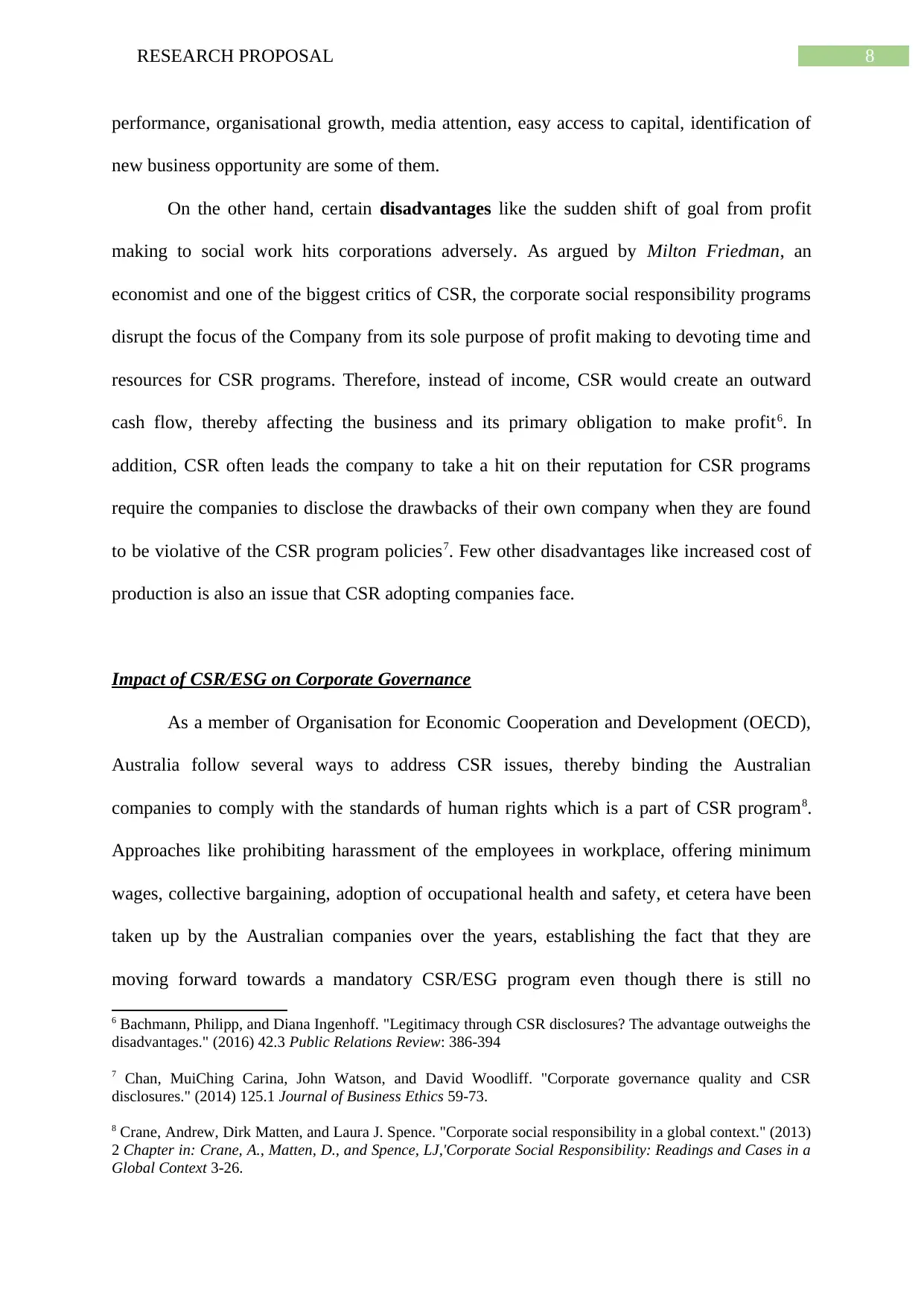
8RESEARCH PROPOSAL
performance, organisational growth, media attention, easy access to capital, identification of
new business opportunity are some of them.
On the other hand, certain disadvantages like the sudden shift of goal from profit
making to social work hits corporations adversely. As argued by Milton Friedman, an
economist and one of the biggest critics of CSR, the corporate social responsibility programs
disrupt the focus of the Company from its sole purpose of profit making to devoting time and
resources for CSR programs. Therefore, instead of income, CSR would create an outward
cash flow, thereby affecting the business and its primary obligation to make profit6. In
addition, CSR often leads the company to take a hit on their reputation for CSR programs
require the companies to disclose the drawbacks of their own company when they are found
to be violative of the CSR program policies7. Few other disadvantages like increased cost of
production is also an issue that CSR adopting companies face.
Impact of CSR/ESG on Corporate Governance
As a member of Organisation for Economic Cooperation and Development (OECD),
Australia follow several ways to address CSR issues, thereby binding the Australian
companies to comply with the standards of human rights which is a part of CSR program8.
Approaches like prohibiting harassment of the employees in workplace, offering minimum
wages, collective bargaining, adoption of occupational health and safety, et cetera have been
taken up by the Australian companies over the years, establishing the fact that they are
moving forward towards a mandatory CSR/ESG program even though there is still no
6 Bachmann, Philipp, and Diana Ingenhoff. "Legitimacy through CSR disclosures? The advantage outweighs the
disadvantages." (2016) 42.3 Public Relations Review: 386-394
7 Chan, MuiChing Carina, John Watson, and David Woodliff. "Corporate governance quality and CSR
disclosures." (2014) 125.1 Journal of Business Ethics 59-73.
8 Crane, Andrew, Dirk Matten, and Laura J. Spence. "Corporate social responsibility in a global context." (2013)
2 Chapter in: Crane, A., Matten, D., and Spence, LJ,'Corporate Social Responsibility: Readings and Cases in a
Global Context 3-26.
performance, organisational growth, media attention, easy access to capital, identification of
new business opportunity are some of them.
On the other hand, certain disadvantages like the sudden shift of goal from profit
making to social work hits corporations adversely. As argued by Milton Friedman, an
economist and one of the biggest critics of CSR, the corporate social responsibility programs
disrupt the focus of the Company from its sole purpose of profit making to devoting time and
resources for CSR programs. Therefore, instead of income, CSR would create an outward
cash flow, thereby affecting the business and its primary obligation to make profit6. In
addition, CSR often leads the company to take a hit on their reputation for CSR programs
require the companies to disclose the drawbacks of their own company when they are found
to be violative of the CSR program policies7. Few other disadvantages like increased cost of
production is also an issue that CSR adopting companies face.
Impact of CSR/ESG on Corporate Governance
As a member of Organisation for Economic Cooperation and Development (OECD),
Australia follow several ways to address CSR issues, thereby binding the Australian
companies to comply with the standards of human rights which is a part of CSR program8.
Approaches like prohibiting harassment of the employees in workplace, offering minimum
wages, collective bargaining, adoption of occupational health and safety, et cetera have been
taken up by the Australian companies over the years, establishing the fact that they are
moving forward towards a mandatory CSR/ESG program even though there is still no
6 Bachmann, Philipp, and Diana Ingenhoff. "Legitimacy through CSR disclosures? The advantage outweighs the
disadvantages." (2016) 42.3 Public Relations Review: 386-394
7 Chan, MuiChing Carina, John Watson, and David Woodliff. "Corporate governance quality and CSR
disclosures." (2014) 125.1 Journal of Business Ethics 59-73.
8 Crane, Andrew, Dirk Matten, and Laura J. Spence. "Corporate social responsibility in a global context." (2013)
2 Chapter in: Crane, A., Matten, D., and Spence, LJ,'Corporate Social Responsibility: Readings and Cases in a
Global Context 3-26.
⊘ This is a preview!⊘
Do you want full access?
Subscribe today to unlock all pages.

Trusted by 1+ million students worldwide
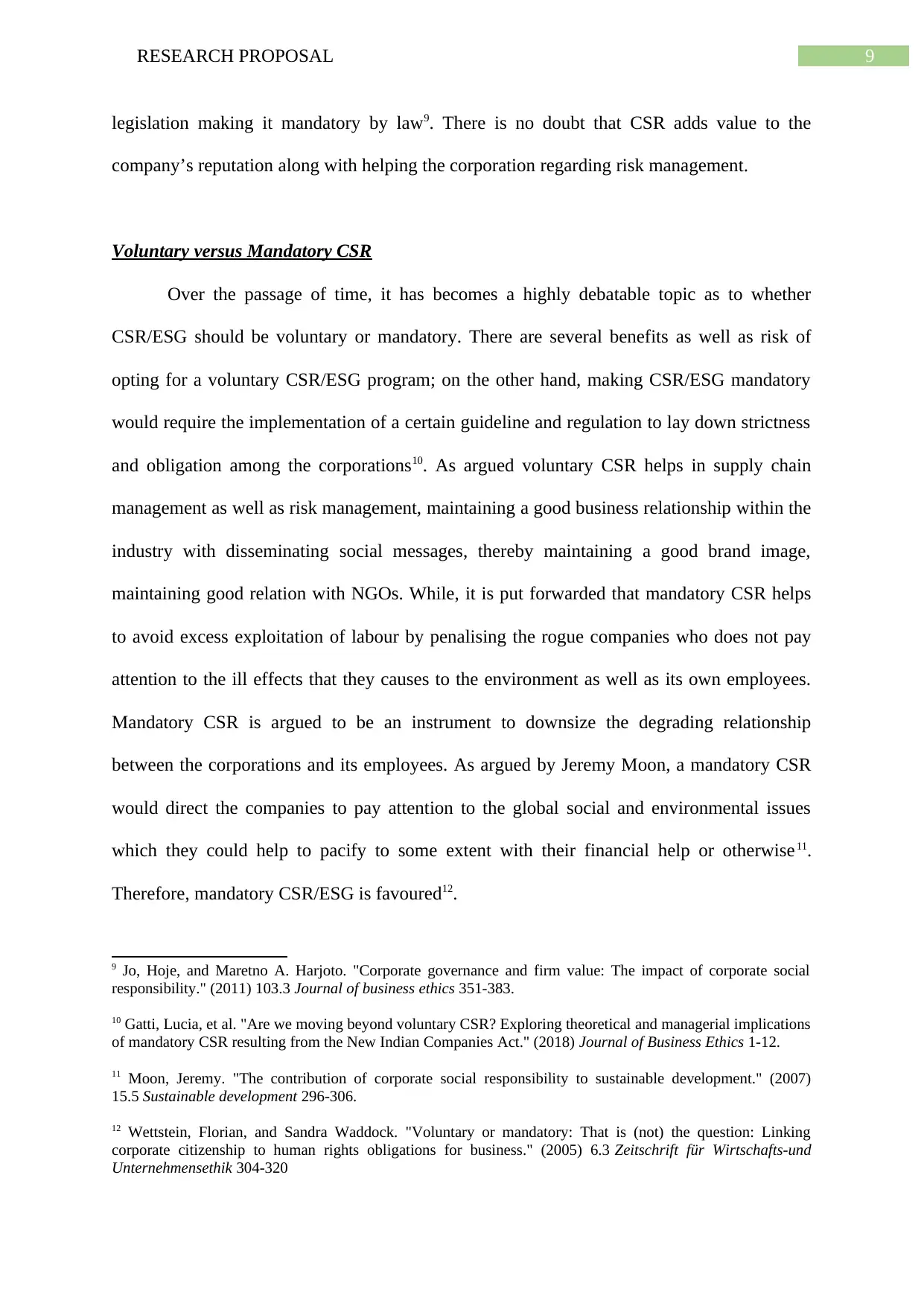
9RESEARCH PROPOSAL
legislation making it mandatory by law9. There is no doubt that CSR adds value to the
company’s reputation along with helping the corporation regarding risk management.
Voluntary versus Mandatory CSR
Over the passage of time, it has becomes a highly debatable topic as to whether
CSR/ESG should be voluntary or mandatory. There are several benefits as well as risk of
opting for a voluntary CSR/ESG program; on the other hand, making CSR/ESG mandatory
would require the implementation of a certain guideline and regulation to lay down strictness
and obligation among the corporations10. As argued voluntary CSR helps in supply chain
management as well as risk management, maintaining a good business relationship within the
industry with disseminating social messages, thereby maintaining a good brand image,
maintaining good relation with NGOs. While, it is put forwarded that mandatory CSR helps
to avoid excess exploitation of labour by penalising the rogue companies who does not pay
attention to the ill effects that they causes to the environment as well as its own employees.
Mandatory CSR is argued to be an instrument to downsize the degrading relationship
between the corporations and its employees. As argued by Jeremy Moon, a mandatory CSR
would direct the companies to pay attention to the global social and environmental issues
which they could help to pacify to some extent with their financial help or otherwise11.
Therefore, mandatory CSR/ESG is favoured12.
9 Jo, Hoje, and Maretno A. Harjoto. "Corporate governance and firm value: The impact of corporate social
responsibility." (2011) 103.3 Journal of business ethics 351-383.
10 Gatti, Lucia, et al. "Are we moving beyond voluntary CSR? Exploring theoretical and managerial implications
of mandatory CSR resulting from the New Indian Companies Act." (2018) Journal of Business Ethics 1-12.
11 Moon, Jeremy. "The contribution of corporate social responsibility to sustainable development." (2007)
15.5 Sustainable development 296-306.
12 Wettstein, Florian, and Sandra Waddock. "Voluntary or mandatory: That is (not) the question: Linking
corporate citizenship to human rights obligations for business." (2005) 6.3 Zeitschrift für Wirtschafts-und
Unternehmensethik 304-320
legislation making it mandatory by law9. There is no doubt that CSR adds value to the
company’s reputation along with helping the corporation regarding risk management.
Voluntary versus Mandatory CSR
Over the passage of time, it has becomes a highly debatable topic as to whether
CSR/ESG should be voluntary or mandatory. There are several benefits as well as risk of
opting for a voluntary CSR/ESG program; on the other hand, making CSR/ESG mandatory
would require the implementation of a certain guideline and regulation to lay down strictness
and obligation among the corporations10. As argued voluntary CSR helps in supply chain
management as well as risk management, maintaining a good business relationship within the
industry with disseminating social messages, thereby maintaining a good brand image,
maintaining good relation with NGOs. While, it is put forwarded that mandatory CSR helps
to avoid excess exploitation of labour by penalising the rogue companies who does not pay
attention to the ill effects that they causes to the environment as well as its own employees.
Mandatory CSR is argued to be an instrument to downsize the degrading relationship
between the corporations and its employees. As argued by Jeremy Moon, a mandatory CSR
would direct the companies to pay attention to the global social and environmental issues
which they could help to pacify to some extent with their financial help or otherwise11.
Therefore, mandatory CSR/ESG is favoured12.
9 Jo, Hoje, and Maretno A. Harjoto. "Corporate governance and firm value: The impact of corporate social
responsibility." (2011) 103.3 Journal of business ethics 351-383.
10 Gatti, Lucia, et al. "Are we moving beyond voluntary CSR? Exploring theoretical and managerial implications
of mandatory CSR resulting from the New Indian Companies Act." (2018) Journal of Business Ethics 1-12.
11 Moon, Jeremy. "The contribution of corporate social responsibility to sustainable development." (2007)
15.5 Sustainable development 296-306.
12 Wettstein, Florian, and Sandra Waddock. "Voluntary or mandatory: That is (not) the question: Linking
corporate citizenship to human rights obligations for business." (2005) 6.3 Zeitschrift für Wirtschafts-und
Unternehmensethik 304-320
Paraphrase This Document
Need a fresh take? Get an instant paraphrase of this document with our AI Paraphraser
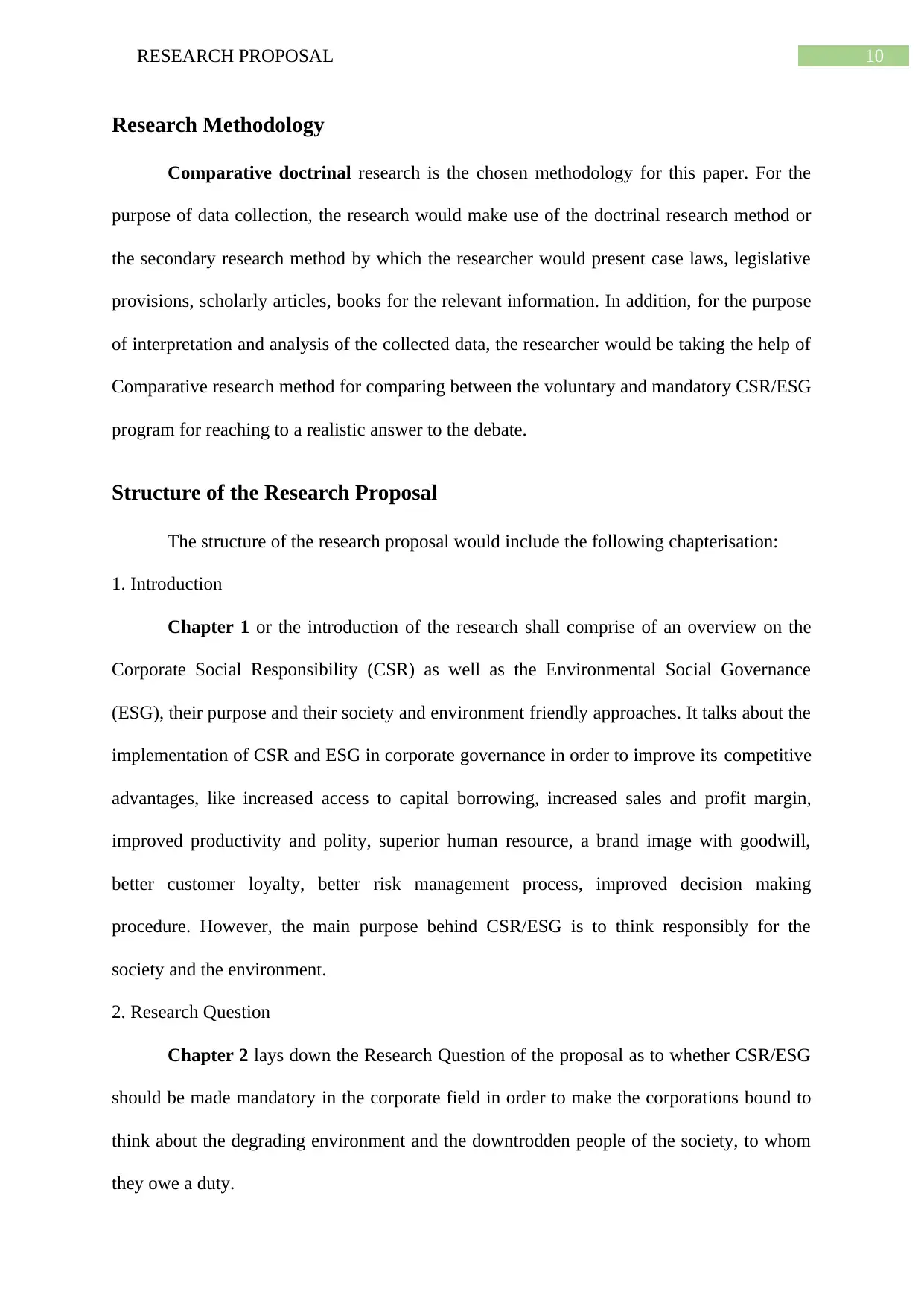
10RESEARCH PROPOSAL
Research Methodology
Comparative doctrinal research is the chosen methodology for this paper. For the
purpose of data collection, the research would make use of the doctrinal research method or
the secondary research method by which the researcher would present case laws, legislative
provisions, scholarly articles, books for the relevant information. In addition, for the purpose
of interpretation and analysis of the collected data, the researcher would be taking the help of
Comparative research method for comparing between the voluntary and mandatory CSR/ESG
program for reaching to a realistic answer to the debate.
Structure of the Research Proposal
The structure of the research proposal would include the following chapterisation:
1. Introduction
Chapter 1 or the introduction of the research shall comprise of an overview on the
Corporate Social Responsibility (CSR) as well as the Environmental Social Governance
(ESG), their purpose and their society and environment friendly approaches. It talks about the
implementation of CSR and ESG in corporate governance in order to improve its competitive
advantages, like increased access to capital borrowing, increased sales and profit margin,
improved productivity and polity, superior human resource, a brand image with goodwill,
better customer loyalty, better risk management process, improved decision making
procedure. However, the main purpose behind CSR/ESG is to think responsibly for the
society and the environment.
2. Research Question
Chapter 2 lays down the Research Question of the proposal as to whether CSR/ESG
should be made mandatory in the corporate field in order to make the corporations bound to
think about the degrading environment and the downtrodden people of the society, to whom
they owe a duty.
Research Methodology
Comparative doctrinal research is the chosen methodology for this paper. For the
purpose of data collection, the research would make use of the doctrinal research method or
the secondary research method by which the researcher would present case laws, legislative
provisions, scholarly articles, books for the relevant information. In addition, for the purpose
of interpretation and analysis of the collected data, the researcher would be taking the help of
Comparative research method for comparing between the voluntary and mandatory CSR/ESG
program for reaching to a realistic answer to the debate.
Structure of the Research Proposal
The structure of the research proposal would include the following chapterisation:
1. Introduction
Chapter 1 or the introduction of the research shall comprise of an overview on the
Corporate Social Responsibility (CSR) as well as the Environmental Social Governance
(ESG), their purpose and their society and environment friendly approaches. It talks about the
implementation of CSR and ESG in corporate governance in order to improve its competitive
advantages, like increased access to capital borrowing, increased sales and profit margin,
improved productivity and polity, superior human resource, a brand image with goodwill,
better customer loyalty, better risk management process, improved decision making
procedure. However, the main purpose behind CSR/ESG is to think responsibly for the
society and the environment.
2. Research Question
Chapter 2 lays down the Research Question of the proposal as to whether CSR/ESG
should be made mandatory in the corporate field in order to make the corporations bound to
think about the degrading environment and the downtrodden people of the society, to whom
they owe a duty.
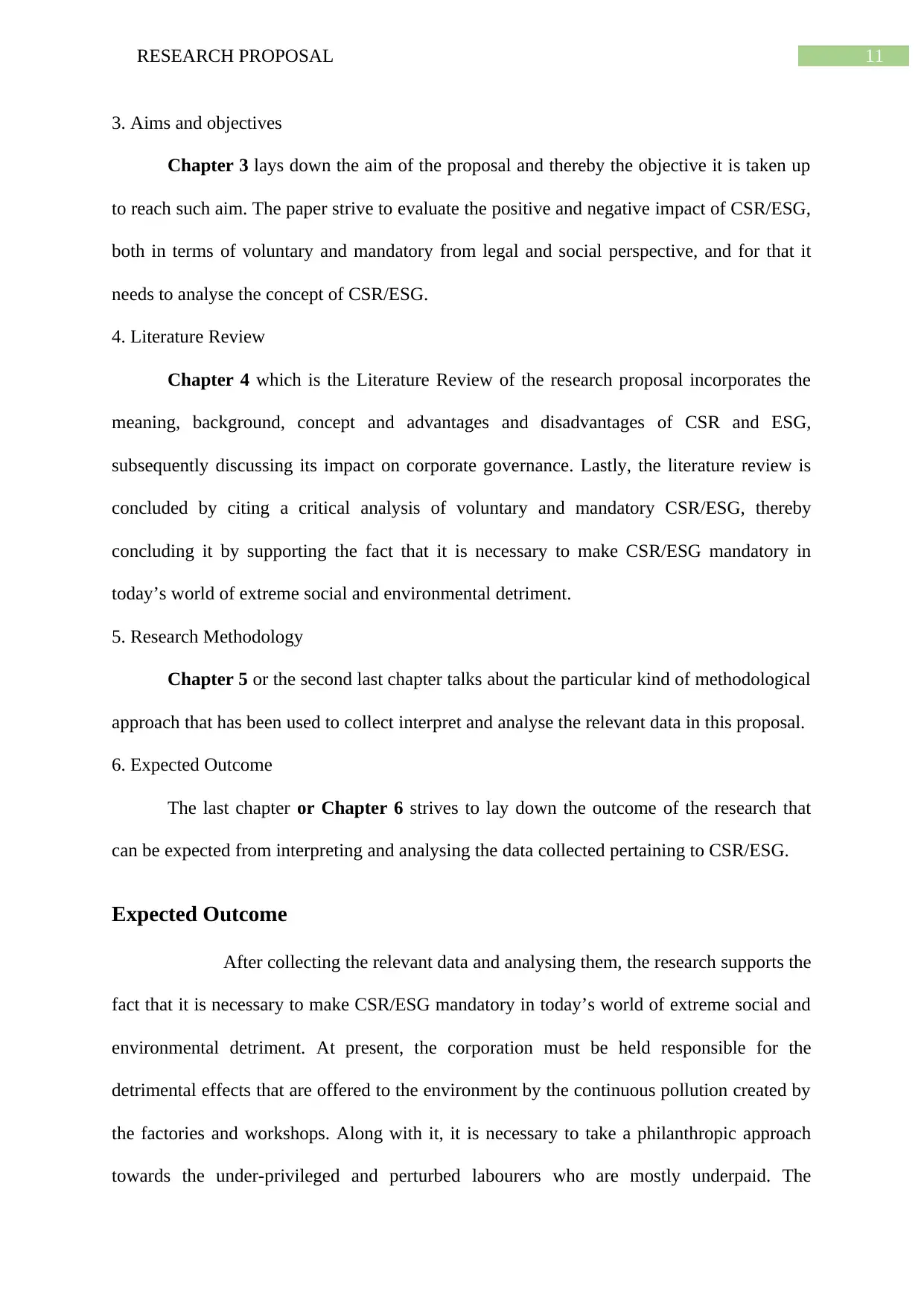
11RESEARCH PROPOSAL
3. Aims and objectives
Chapter 3 lays down the aim of the proposal and thereby the objective it is taken up
to reach such aim. The paper strive to evaluate the positive and negative impact of CSR/ESG,
both in terms of voluntary and mandatory from legal and social perspective, and for that it
needs to analyse the concept of CSR/ESG.
4. Literature Review
Chapter 4 which is the Literature Review of the research proposal incorporates the
meaning, background, concept and advantages and disadvantages of CSR and ESG,
subsequently discussing its impact on corporate governance. Lastly, the literature review is
concluded by citing a critical analysis of voluntary and mandatory CSR/ESG, thereby
concluding it by supporting the fact that it is necessary to make CSR/ESG mandatory in
today’s world of extreme social and environmental detriment.
5. Research Methodology
Chapter 5 or the second last chapter talks about the particular kind of methodological
approach that has been used to collect interpret and analyse the relevant data in this proposal.
6. Expected Outcome
The last chapter or Chapter 6 strives to lay down the outcome of the research that
can be expected from interpreting and analysing the data collected pertaining to CSR/ESG.
Expected Outcome
After collecting the relevant data and analysing them, the research supports the
fact that it is necessary to make CSR/ESG mandatory in today’s world of extreme social and
environmental detriment. At present, the corporation must be held responsible for the
detrimental effects that are offered to the environment by the continuous pollution created by
the factories and workshops. Along with it, it is necessary to take a philanthropic approach
towards the under-privileged and perturbed labourers who are mostly underpaid. The
3. Aims and objectives
Chapter 3 lays down the aim of the proposal and thereby the objective it is taken up
to reach such aim. The paper strive to evaluate the positive and negative impact of CSR/ESG,
both in terms of voluntary and mandatory from legal and social perspective, and for that it
needs to analyse the concept of CSR/ESG.
4. Literature Review
Chapter 4 which is the Literature Review of the research proposal incorporates the
meaning, background, concept and advantages and disadvantages of CSR and ESG,
subsequently discussing its impact on corporate governance. Lastly, the literature review is
concluded by citing a critical analysis of voluntary and mandatory CSR/ESG, thereby
concluding it by supporting the fact that it is necessary to make CSR/ESG mandatory in
today’s world of extreme social and environmental detriment.
5. Research Methodology
Chapter 5 or the second last chapter talks about the particular kind of methodological
approach that has been used to collect interpret and analyse the relevant data in this proposal.
6. Expected Outcome
The last chapter or Chapter 6 strives to lay down the outcome of the research that
can be expected from interpreting and analysing the data collected pertaining to CSR/ESG.
Expected Outcome
After collecting the relevant data and analysing them, the research supports the
fact that it is necessary to make CSR/ESG mandatory in today’s world of extreme social and
environmental detriment. At present, the corporation must be held responsible for the
detrimental effects that are offered to the environment by the continuous pollution created by
the factories and workshops. Along with it, it is necessary to take a philanthropic approach
towards the under-privileged and perturbed labourers who are mostly underpaid. The
⊘ This is a preview!⊘
Do you want full access?
Subscribe today to unlock all pages.

Trusted by 1+ million students worldwide
1 out of 15
Related Documents
Your All-in-One AI-Powered Toolkit for Academic Success.
+13062052269
info@desklib.com
Available 24*7 on WhatsApp / Email
![[object Object]](/_next/static/media/star-bottom.7253800d.svg)
Unlock your academic potential
Copyright © 2020–2025 A2Z Services. All Rights Reserved. Developed and managed by ZUCOL.





